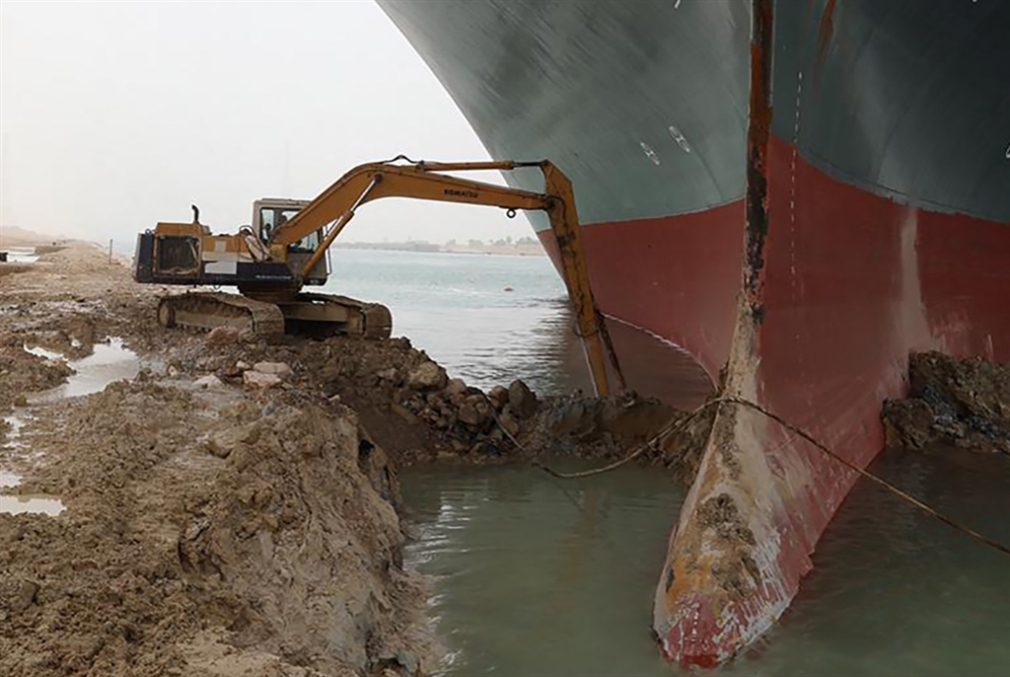The container ship found itself stuck in the Suez Canal on March 23rd and disrupted shipments scheduled to cross the major global waterway for almost a week.
From concerns over its toll on global trade to circulating memes on social media, the blocking of the Suez Canal earlier this week struck the world by surprise.
On March 23rd, the Panama-flagged, Japanese-owned Ever Given container ship sailed down the key global waterway before finding itself wedged in between the two banks. For more than a week, world shipping operations including the transportation of gas crude oil from the Middle East to Europe and the US, came to a stand still.
UK-based Argus Media reported that eight of the 14 LNG vessels from Qatargas were among those waiting to transit at the Suez Canal en route Doha’s Ras Laffan facility.
The report added that two of the vessels, Al Bahiya and Al Nuama LNG tankers, were forced to reroute around the Cape of Good Hope instead. The two carriers were scheduled to arrive before April 20th, but are now expected to take 13-to-18 days to complete their journey.
While Qatargas has yet to issue a statement to outline the impact of the incident on the Gulf state’s oil exports, Dr. Steven Wright Associate Professor of International Relations at Hamad Bin Khalifa University in Qatar [HBKU] told Doha News that it “would’ve had a marginal impact” on the shipments.
“The majority of Qatar’s trade is with east Asia, it’s a major trading partner when it comes to LNG with Japan, South Korea, Europe is an important but a lesser market in the grand scheme of things. The impact it would have is that it would just add extra days to navigate North of Africa,” said Dr. Wright.
Read also: QP to become sole owner of QatarGas after 25-year partnership
However, the Argus Media report said the diversions would still push shipment loadings at Ras Laffan, initially set to take place between March and April, to the second half of April and first half of May.
As a result of the delay, northeast Asia may witness delays in Qatari deliveries, with shipments expected between the second half of May or June. Deliveries typically take 2 to 3 weeks to reach their destinations.
Despite the hold up, Dr. Wright believes that one of the pillars of Qatar’s LNG sectors is its reliability as a supplier, making the impact fairly minimal.
“There are storage tankers in the places they deliver the gas to, so it wouldn’t really result in the interruption of supply. Also, the timing of the crisis is taking place in Easter, so it’s not in the winter period when there is a higher demand for natural gas,” he said.
On Tuesday, the Ever Given was freed after spending several days grounded in the canal, which sees some 30% of world trade pass through its waters. The six-day incident had a major impact on global sea shipments and accumulated some $9 billion in damage to global trade for every day it continued.
Last year, at least 19,000 ships passed through the waterway. This week, some 400 ships were forced to float on either end of the canal to allow for authorities to free the vessel.
“The incident is a reminder of how fragile global supply chains are,” Dr. Wright said, commenting on the dependability of ships on the canal.
With the Ever Given now on its way to its destination, Egyptian authorities have launched a formal investigation to determine the circumstances that led to its grounding.
Follow Doha News on Twitter, Instagram, Facebook and Youtube







